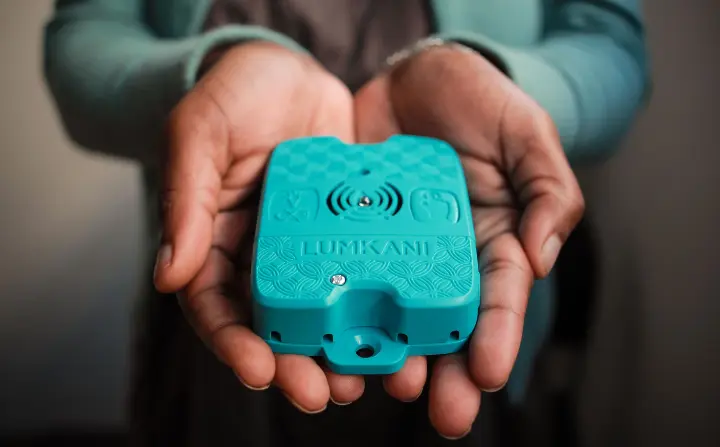In the informal settlements of South Africa, where corrugated iron homes lean tightly against each other and open-flame stoves are still the norm, a local innovation is quietly preventing disasters, one household at a time.
Meet Lumkani, a fire detection device built specifically for African informal communities. In a continent where nearly 60% of urban dwellers live in unplanned settlements, and fires routinely claim homes, belongings, and lives, this small heat-detecting device is transforming community safety from the inside out.
 Pic courtesy: Lumkani
Pic courtesy: Lumkani
Not Just an Alarm, a Network
Unlike conventional smoke alarms, Lumkani detects the rate of temperature rise, which matters in settlements where daily cooking smoke would otherwise trigger endless false alarms. Once activated, the device immediately sends a radio signal to neighboring Lumkani units within a 60-meter radius, creating a local network of alerts.
Residents don’t just get a siren, they receive instant SMS notifications if a fire erupts in their area. The system even sends the GPS coordinates of the fire to a central monitoring station, ensuring emergency services can respond faster, and communities can rally before flames spread.
Video courtesy of The Tech Awards 2015
Homegrown, Practical, and Affordable
Born in the streets of Khayelitsha, Cape Town, Lumkani was designed by local engineers and community members who knew that safety tech needed to be affordable, durable, and tailored to township realities. At around $15 per device, it’s far cheaper than global equivalents and built tough for African conditions.
Beyond detection, Lumkani pairs with micro-insurance products, offering low-income families the chance to recover after a disaster. It’s an innovation that doesn’t just prevent tragedy, it restores dignity.
The Numbers Behind the Impact
Since its launch, Lumkani has:
- Installed over 20,000 devices across high-risk areas.
- Protected more than 67,000 lives.
- Cut the number of major slum fires in pilot areas by over 90%.
- Created local jobs for installers, educators, and community fire monitors.
This is what African innovation for Africans looks like — rooted in need, powered by community, and focused on survival and security first.
Why This Matters for Africa’s Future?
As African cities grow, urban informal settlements will only expand. Traditional fire services cannot keep up with labyrinthine alleyways and densely packed homes. Solutions like Lumkani reveal what’s possible when innovation meets local context.
It also speaks to a larger, pressing conversation: Why aren’t more African urban safety policies investing in homegrown solutions like this? What would happen if every African government backed a Lumkani-style initiative nationwide?